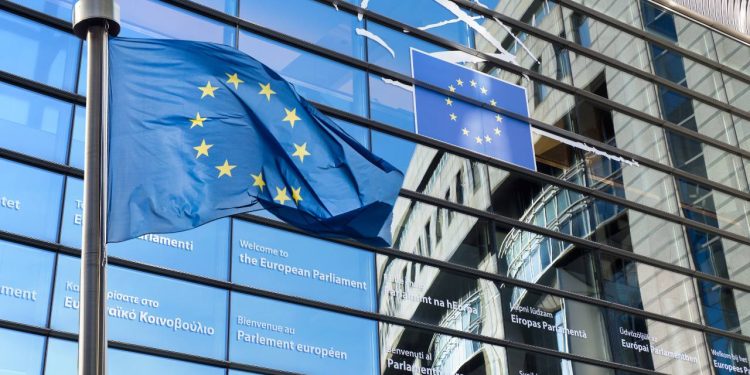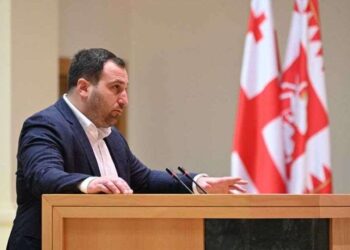With a draft resolution, the European Parliament calls on the European Union to freeze aid to the Georgian government, sanction Bidzina Ivanishvili and the persons responsible for the decline of democracy, and establish the compliance of anti-democratic laws with visa liberalization criteria.
The draft resolution calls on the Georgian government to stop the campaign of intimidation of opponents and anti-Western disinformation, to impose sanctions on Russia, to release ex-president Mikheil Saakashvili on humanitarian grounds, and to ensure a peaceful transfer of power based on the results of the elections.
On October 9, the European Parliament will vote on the resolution “On the decline of democracy and threats to political pluralism in Georgia”. Initially, the draft of 7 different political groups was prepared in the parliament, and finally the text was agreed by the “European People’s Party” (EPP), “European Conservatives and Reformists” (ECR), Renew Europe, Greens (Verts/ALE) and “Social Democrats”. between political groups. Amendments may be made to the text during the vote.
The draft joint resolution states that there have been significant attacks on democracy in Georgia over the past months. The subject of concern of MEPs is the so-called The Russian law on agents, the law restricting the rights of LGBT people and imposing censorship, changes to the election code, the promise to ban the opposition, the increasing anti-Western and hostile rhetoric of the “Georgian Dream” against Georgia’s democratic partners, as well as the propaganda of Russian disinformation, manipulation and conspiracy theories.
“This hostile rhetoric also applies to Ukraine, as the ruling party uses vile political banners depicting Ukrainian cities destroyed by Russia and profiting from the suffering of brave Ukrainians,” the draft resolution reads.
It is also emphasized that the leaders of the ruling party of Georgia approved the statement of the Russian Foreign Minister that Moscow is ready to help Georgia normalize relations with “neighboring … Abkhazia and South Ossetia”, which, according to the authors of the resolution, “demonstrates a departure from the policy of recognizing the occupied regions by the Georgian government”.
More specifically, with the draft resolution, the European Parliament:
“Deeply regrets the democratic backsliding in Georgia, which is increasing during the current year, especially in the run-up to the parliamentary elections on 26 October 2024;Draft resolution:Strongly condemns the adoption of laws on “transparency of foreign influence” and “family values and protection of minors”, as well as amendments to the election code;believes that these are tools used by the government to violate freedom of expression, censor the media, limit critical voices in civil society and the non-governmental sector, or discriminate against vulnerable people;emphasizes that this is incompatible with the values and democratic principles of the European Union, contradicts the ambitions of Georgia to join the European Union, damages the international reputation of Georgia and endangers the Euro-Atlantic integration of the country;Emphasizes that until the above legislation is repealed, it is impossible to achieve progress in Georgia’s relations with the European Union; It laments that Georgia, once a champion of democratic progress with Euro-Atlantic aspirations, has been in a “free fall” of democratic deterioration for a significant period of time.
“[The European Parliament] condemns the personal role of Georgian oligarch Bidzina Ivanishvili, who returned to active politics on December 30, 2023, when he became the “honorary chairman” of the “Georgian Dream” party, in the current political crisis and in digging the foundation for the country’s Euro-Atlantic orientation in order to turn to Russia;The [European Parliament] once again calls on the [European] Council and the democratic partners of the European Union to impose immediate and targeted personal sanctions on Ivanishvili for his role in the deterioration of the political process in Georgia;[European Parliament] calls on the EU and its member states to hold accountable and introduce personal sanctions against all those responsible for undermining democracy in Georgia, complicit in violence against political opponents and peaceful demonstrators, and those spreading anti-Western disinformation; [European Parliament] welcomes the personal sanctions introduced by the US against Georgian Dream officials.
“[The European Parliament] notes that on December 14 and 15, 2023, the European Council granted Georgia the status of a candidate country in the sense that appropriate steps would be taken based on the recommendations published by the European Commission on November 8, 2023;[The European Parliament] emphasizes that the recently adopted laws clearly contradict this ambition and have stopped Georgia’s integration into the European Union.
“[The European Parliament] reiterates its call on the European Commission to rapidly assess the impact on Georgia’s ongoing implementation of visa liberalization requirements, particularly the fundamental rights requirement, which is a key component of the EU’s visa liberalization policy, the “transparency of foreign influence” and “family values and protection of minors” laws, the abolition of gender quotas and other changes in the electoral legislation, the implementation of the recommendations of the Venice Commission and the conduct of elections in accordance with accepted international standards.
“[The European Parliament] reiterates the demand for the immediate and unconditional release of former President Mikheil Saakashvili on humanitarian grounds so that he may receive medical assistance abroad;[The European Parliament] emphasizes that the Government of Georgia bears full and undisputed responsibility for the life, health, safety and well-being of former President Mikheil Saakashvili, and should be fully responsible for any harm caused to him.














